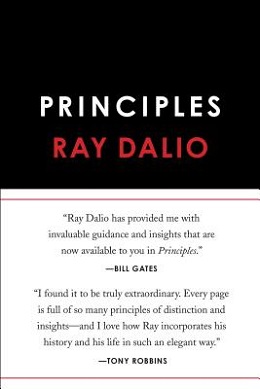
Learning from Mistakes: Insights from Ray Dalio
- Colin
- English for career
- July 20, 2024
Table of Contents
Conversation
The following is a simulated conversation between an entrepreneur and Ray Dalio, where the entrepreneur seeks advice from Ray. Ray Dalio’s responses are based on content from his book Principles, specifically Part III: Work Principles, Section 3: Create a Culture in Which It Is Okay to Make Mistakes and Unacceptable Not to Learn from Them.
Entrepreneur: Hi Ray, thank you for taking the time to speak with me. As a young entrepreneur, I’m always looking for ways to improve myself and my business. Can you share some of your insights on learning from mistakes?
Ray: Of course. One fundamental principle I follow is that pain is a message that tells you something is wrong, and it’s an effective teacher that one shouldn’t do that wrong thing again.
Entrepreneur: That makes sense. I often find myself reflecting on past decisions. How can I know if I’ve truly learned from my experiences?
Ray: If you look back on yourself a year ago and aren’t shocked by how stupid you were, you haven’t learned much. Self-reflection is crucial for growth.
Entrepreneur: I see. What qualities do you think are most important when hiring new team members?
Ray: I have found that hiring self-reflective people is one of the most important things I can do. Intelligent people who embrace their mistakes and weaknesses substantially outperform their peers who have the same abilities but bigger ego barriers.
Entrepreneur: That’s a great point. I sometimes struggle with admitting my own mistakes. How do you handle being wrong?
Ray: I don’t mind being wrong in the way of being right. It’s important to see mistakes as opportunities for learning and improvement.
Entrepreneur: That’s encouraging. But what should I do when I feel the pain of a mistake? It can be quite overwhelming.
Ray: Because these moments of pain are so important, you shouldn’t rush through them. Stay in them and explore them so you can build a foundation for improvement.
Entrepreneur: I’ll try to keep that in mind. How can I ensure that my team also benefits from this approach?
Ray: We all have blind spots; people are by definition subjective. For this reason, it’s everyone’s responsibility to help others learn what is true about themselves by giving them honest feedback, holding them accountable, and working through disagreements in an open-minded way.
Entrepreneur: That sounds like a healthy culture to build. Is there a practical tool you recommend for tracking mistakes?
Ray: Using the issue log is mandatory to face up to their mistakes. It helps you systematically address and learn from each issue.
Entrepreneur: That’s very practical advice. Lastly, how do I distinguish between acceptable and unacceptable mistakes?
Ray: Know what types of mistakes are acceptable and what types are unacceptable, and don’t allow the people who work for you to make unacceptable ones. This ensures that your team learns and grows without repeating costly errors.
Entrepreneur: Thank you, Ray. This has been incredibly insightful. I’ll definitely apply these principles to my business.
Ray: You’re welcome. Remember, continual learning and improvement are key to success. Good luck with your ventures.
Certainly! Here is an example of an issue log based on challenges that a startup founder might encounter:
Issue Log Example
| Issue ID | Date Logged | Issue Description | Category | Impact Level | Assigned To | Action Taken | Resolution Date | Lessons Learned | Follow-Up Actions |
|---|---|---|---|---|---|---|---|---|---|
| 001 | 2024-07-01 | Delays in product development due to unclear project requirements. | Project Management | High | Product Manager | Organized a workshop to clarify requirements and set clear milestones. | 2024-07-03 | Ensure all project requirements are clearly defined from the start. | Regular requirement review meetings. |
| 002 | 2024-07-05 | Marketing campaign underperformed leading to low customer acquisition. | Marketing | Medium | Marketing Team | Analyzed campaign data, adjusted target audience, and relaunched campaign. | 2024-07-10 | Continuously monitor and adapt marketing strategies. | Implement ongoing campaign performance reviews. |
| 003 | 2024-07-12 | Conflict among co-founders causing decision-making delays. | Team Dynamics | High | Co-founders | Facilitated a mediation session to address issues and establish decision-making protocols. | 2024-07-14 | Importance of clear communication and conflict resolution strategies. | Schedule regular co-founder alignment meetings. |
| 004 | 2024-07-15 | Cash flow issues due to unexpected expenses. | Financial | High | CFO | Reviewed budget, cut non-essential expenses, and sought additional funding. | 2024-07-17 | Maintain a buffer for unexpected expenses and closely monitor cash flow. | Monthly financial health checks. |
| 005 | 2024-07-18 | Negative customer feedback on product usability. | Customer Feedback | Medium | UX/UI Designer | Conducted user testing sessions and implemented design improvements. | 2024-07-20 | Prioritize user testing and feedback in the development process. | Regular user feedback sessions. |
Instructions for Using the Issue Log
- Issue ID: Assign a unique identifier to each issue for easy reference.
- Date Logged: Record the date when the issue was identified.
- Issue Description: Provide a brief but detailed description of the issue.
- Category: Classify the issue (e.g., Project Management, Marketing, Team Dynamics, Financial, Customer Feedback).
- Impact Level: Assess the impact level of the issue (e.g., Low, Medium, High).
- Assigned To: Assign a team member responsible for addressing the issue.
- Action Taken: Document the actions taken to resolve the issue.
- Resolution Date: Record the date when the issue was resolved.
- Lessons Learned: Summarize the key lessons learned from the issue.
- Follow-Up Actions: Identify any follow-up actions needed to prevent recurrence of the issue.
By using this issue log, you can systematically track and address problems, fostering a culture of learning and continuous improvement.

